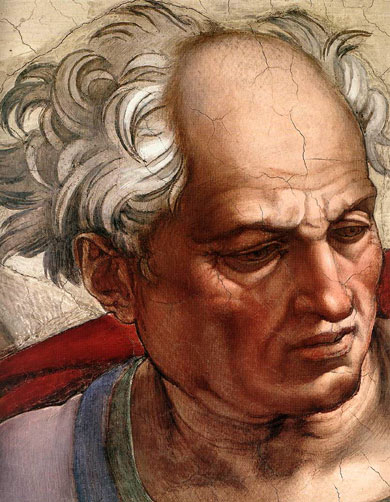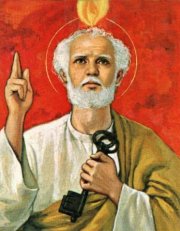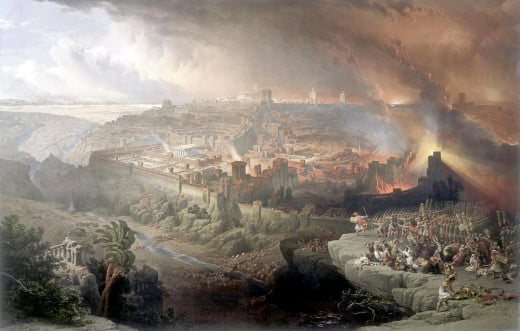
 |
| Peter the Apostle |
The Church Prophesied of by Joel
“This Is That Spoken Of By The Prophet Joel”
But Peter, standing up with the eleven, lift up his voice, and said unto them, Ye men of Judea, and all ye that dwell at Jerusalem, be this known unto you, and hearken to my words: For these are not drunken, as ye suppose, seeing it is but the third hour of the day. But this is that which was spoken by the prophet Joel.(The Apostle Peter, Acts 2:14-16)
My correspondence, here, concerns the prophet Joel; specifically his prophecy concerning the Messianic Age: the time of Israel’s restoration. A time when deliverance would be “in mount Zion and in Jerusalem” (Joel 2:32). This letter will contain the same characteristics as letter number six and that which will be found, also, in the next two correspondences; namely, 1) the prophecy concerning the Kingdom of the Messiah, and 2) the apostle’s interpretation of the Kingdom Prophecies fulfillment. This format is important for it is the apostle’s doctrine that is the fingerprint of truth. As a student of the Scripture you must always keep in the forefront of your mind the fact that Christ “opened ... their understanding, that they might understand the Scriptures” (Luke 24:45). Therefore, the apostle’s interpretation of the Old Testament prophets must be accepted over those interpretations of various men of more recent history.
As stated, this article concerns itself with the Messianic Kingdom prophecies of the prophet Joel; further, it will consider the Apostle Peter as the interpreter of Joel’s prognostics. To aid your comparison of Joel and Peter, I will give them both at this point:
Joel,Joel 2:28 And it shall come to pass afterward, that I will pour out my spirit upon all flesh; and your sons and your daughters shall prophesy, your old men shall dream dreams, your young men shall see visions:29 And also upon the servants and upon the handmaids in those days will I pour out my spirit.30 And I will shew wonders in the heavens and in the earth, blood, and fire, and pillars of smoke.31 The sun shall be turned into darkness, and the moon into blood, before the great and the terrible day of the LORD come.32 And it shall come to pass, that whosoever shall call on the name of the LORD shall be delivered: for in mount Zion and in Jerusalem shall be deliverance, as the LORD hath said, and in the remnant whom the LORD shall call.Peter:Acts 2:16 "But this is that which was spoken by the prophet Joel; 17 And it shall come to pass in the last days, saith God, I will pour out of my Spirit upon all flesh: and your sons and your daughters shall prophesy, and your young men shall see visions, and your old men shall dream dreams: 18 And on my servants and on my handmaidens I will pour out in those days of my Spirit; and they shall prophesy: 19 And I will shew wonders in heaven above, and signs in the earth beneath; blood, and fire, and vapour of smoke: 20 The sun shall be turned into darkness, and the moon into blood, before that great and notable day of the Lord come: 21 And it shall come to pass, that whosoever shall call on the name of the Lord shall be saved."
The prophecy of Joel (Joel 2:28-32) speaks of a time belonging to the Messianic period (i.e. that time when Israel would enter its golden age at the head of all nations of the earth, with the Messiah – the Son of David – as its King). This is attested to by most every scholar. The language of the text itself speaks to this end: verse 32 states – “and it shall come to pass that whosoever shall call on the name of the LORD shall be delivered: for in Zion and in Jerusalem shall be deliverance, as the LORD has said, and in the remnant whom the Lord shall call.” The language indicates that deliverance shall issue forth from Mount Zion, out of Jerusalem. This deliverance will be available for “whosoever, will call upon the name of the LORD;” this includes both Jews and Gentiles. The language is of the same character as other Messianic texts: such as Amos 9:11-12 where the rebuilding of the tabernacle of David provides salvation for all the heathen, “which are called by my name, saith the LORD that doeth this”. (See also Isaiah 46:13; and Malachi 1:11).

The Day of the Lord
A key feature of the Joel prophecy is the word “afterward” in verse 28. According to this verse the Spirit of God would be poured out upon “all flesh” (Jew and Gentile alike) only “after” the events that precedes Joel 2:28. It is clear that Joel is speaking of the “day of the LORD.” This phrase (day of the LORD) occurs five times in Joel and is the dominant theme of the book. The term first appears in Joel 1:15, then 2:1, 11, 31; and 3:14. Joel’s use of this term indicates a time of God’s judgment upon Israel. Malachi uses the same term when he references the same judgment (see Malachi 4:5).
A quick survey of the book of Joel shows the following, leading up to our text:
- The plague of insects may be understood as both literal and allegorical (see 1:1-20). In the allegorical sense one would think of the Babylonians as the palmerworm, the Medo-Persians as the locusts, the Greeks as the cankerworm, and the Romans as the caterpillar (1:4). Joel sees the destruction caused by this great swarm as leading up the “day of the LORD.” See 1:15.
- Then came the prophet’s warning concerning the “day of the LORD” (2:1-11). He sees a great army, that devours the land before it, which is well disciplined and armored. It is described as a time when the “sun and the moon shall be dark, and the stars shall withdraw their shining” (2:10). For a clear understanding of this prophetic allegory, one should see Isaiah 13:10, where the same language is used by Isaiah to describe the destruction of Babylon. This is common prophetic poetry employed to convey the idea of a turning of the age: the overturning of the powers that be, and the establishing of others. Joel revisits the thought in 2:31 and 3:15; each passage is speaking of the same event. This is a reference to the Roman-Jewish War that brought the destruction of Judaism: namely, the total razing of the Temple—the “day of the LORD”. (Be careful to see Malachi 4:5 as it compares to Matthew 11:13-14; and 17:12-13.)
- Joel calls the nation of Israel to repentance (2:12-17). Perhaps God will turn from His judgment and leave a blessings instead. Actually, the passage (2:14) states: “And leave a blessing behind him.” The thought is; The Lord will indeed come on the “day of the LORD;” but, for those who repent, a blessing will be left behind when the “day of the LORD” is past. This is, indeed, the case; for 2:28 speaks of the out pouring of the spirit during the Messianic period as taking place after the “day of the LORD.”
- The Prophet Joel tells of a great deliverance and restoration that is conditional upon repentance (see 2:18-27). Those who repented received the blessing and entered the Messianic Kingdom as Spirit filled believers (Acts 2:1-4), those who were unrepentant experienced the wrath of God in “the great and dreadful day of the LORD” (see Malachi 4:5 as compared with Matthew 23:34-38). The Apostle Paul speaks of these two separate groups of Jews in Romans chapter 11 where the Jews of faith are called “the election” as opposed to the Israel of unbelief.
A SERVEY OF JOEL 2:28-32
Where Joel uses the word “afterward” (2:28), Peter uses the term “last days,”when quoting this very verse from Joel (see Acts 2:17). It is most likely that Peter is referencing the last days of the Jewish economy; the time period between the supreme unrepentant act of the crucifixion ( A.D. 30), to the supreme and final judgment on the “house” that rejected and killed its Master (see Matthew 23:37-38 as compared with Luke 20:9-19).
The out pouring of the Spirit of God foretold by Joel is parallel to Jeremiah’s prophecy of: “after those days, saith the LORD, I will put my law in their inward parts, and write it in their hearts; and will be their God, and they shall be my people.” (See Jeremiah 31:33; and my article entitled “God’s New Covenant with Israel” ) It is clear to all concerned, that both Jeremiah and Joel have the Messianic Kingdom in view.
The reference to blood, in verse 30, is a reference to war; while the fire and smoke of the same verse are signs of God’s presence (see Genesis 5:17 and Exodus 19:18). Together they speak of God employing war to bring about, and execute, “the day of the LORD.”
The “whosoever” clause of verse 32 speaks of the Messianic Blessing of Salvation, once particular to Jews only, now available to all men. This component is also present in both Amos’ and Malachi’s Kingdom prophecies (see Amos 9:12 and Malachi 1:12 respectively).
Also, verse 32 speaks of “Mount Zion and ... Jerusalem,” which has the church in view: see Hebrews 12:22. Here the disciple is said to come “unto Mount Sion, and unto the city of the living God, the Heavenly Jerusalem.” When, in fact, the writer is speaking of the Church.
Lastly, verse 22 states that this Messianic Kingdom will be established “in the remnant whom the LORD shall call.” Paul refers to this in Romans 11:1-5, 7 where he writes that the “remnant according to the election of grace” (Romans 11:5), hath, indeed, obtained the Messianic Blessing that “the rest” sought, but did not obtain because of their unbelief (Romans 11:20).
Conclusion
Having set before you these few thoughts on the Kingdom Prophecy of Joel, perhaps it is clear, that, according to the apostle Peter (Acts 2:16), the outpouring of the Holy Spirit on the Day of Pentecost (AD 30), brought the Messianic Kingdom into existence. And, further, perhaps it is clear that after the destruction of the Jewish temple (namely, “The Day of the LORD”), the Kingdom of the Messiah has spread over the entire earth and embraces “ALL FLESH.”
The God of all peace keep you, is my prayer for you all.
Apostolically Speaking
☩☩ Jerry L Hayes
(Mar David Ignatius)
The above article is an excerpt from my book entitled "Letters to My Children on Apostolic Kingdom Theology." "Letters" is a compilation of twenty-four letters I wrote to my children mapping my conversion from Dispensationalism to Realized Millennialism. If you are interested in the study of eschatology I am sure you will want this book. Order your personal copy today from the link provided here:
(Mar David Ignatius)
The above article is an excerpt from my book entitled "Letters to My Children on Apostolic Kingdom Theology." "Letters" is a compilation of twenty-four letters I wrote to my children mapping my conversion from Dispensationalism to Realized Millennialism. If you are interested in the study of eschatology I am sure you will want this book. Order your personal copy today from the link provided here:
THANK YOU FOR YOUR SUPPORT BY PURCHASING MY BOOKS FOR YOUR LIBRARY. -JLH
Be sure to listen and subscribe to the Bishop's Podcast: Apostolic Bishop, at:
Read other epistles from the Bishop on Apostolic Kingdom Theology:
God’s New Covenant With Israel
Apostolic Eschatology
The Prophets Speak of the Church
Apostolic Kingdom Theology vs Futurism
Dating the Book of Revelation
Prophecy and the Spiral Staircase
The Three Horsemen of Dispensationalism
Correct Method of Interpreting the Book of Revelation
Millennial Reign of Christ
http://bishopjerrylhayes.blogspot.com/2019/09/millennial-reign-of-christ.html
All These Things (A Study on Matthew 24)
http://bishopjerrylhayes.blogspot.com/2019/09/all-these-things-kingdom-teaching-of.html
Second Coming of Christ Jesus
https://bishopjerrylhayes.blogspot.com/2019/09/second-coming-of-christ-jesus.html
All These Things (A Study on Matthew 24)
http://bishopjerrylhayes.blogspot.com/2019/09/all-these-things-kingdom-teaching-of.html
Second Coming of Christ Jesus
https://bishopjerrylhayes.blogspot.com/2019/09/second-coming-of-christ-jesus.html
The Apocalypse, is the introduction to the biblical book of Revelation. Here Bishop Hayes also gives a verse by verse commentary of the first three chapters of the Apostle John's Revelation of Jesus Christ, covering the letters addressed to the seven churches of Asia Minor. The Bible student will thrill at the Bishop's easy evangelistic style of presenting deep and unique truths never before published. In this study a wealth of information will be shared with the disciples of Christ on each verse of this great manuscript.
Own your personal copy of this enlightening work by ordering at the link provided here:
https://www.amazon.com/Apocalypse-Introduction-Epistles-Seven-Churches/dp/1686423152/ref=sr_1_1?keywords=Bishop+Jerry+Hayes%2C+Apocalypse&qid=1568308793&s=books&sr=1-1
https://www.amazon.com/Apocalypse-Introduction-Epistles-Seven-Churches/dp/1686423152/ref=sr_1_1?keywords=Bishop+Jerry+Hayes%2C+Apocalypse&qid=1568308793&s=books&sr=1-1



No comments:
Post a Comment